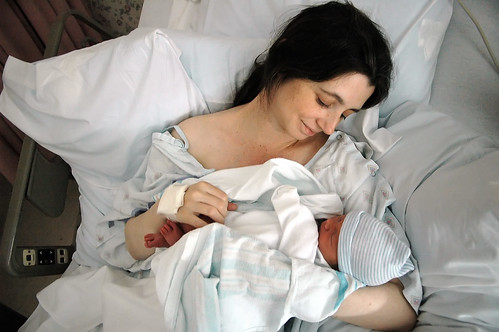
I’ve recounted here the story of how I became a mother, for both the first and second time, in all of its gory detail.
If my great grandmother was alive, the namesake of my firstborn, she’d have corrected me loud and clear (she was 102 when she died and only a smidgeon deaf) that my babies “weren’t born, they were hatched.”
I wouldn’t have been offended.
But I'm sure there's someone out there who would have been.
Seems as though there has always been consternation concerning the C.
Many will tell you hospitals are performing cesareans far too often; some will tell you it’s ethical for women to choose surgery first; a few will tell you the medical profession has ruined the miracle of birth for women and others will say that lawyers ruined it for everyone.
Now, it seems, a few folks are likening cesarean sections to rape, saying that they weren’t given a choice. Doctors forcibly, or through coercion or lies, entered their bodies to remove their children, robbing them of a natural birth and leaving them with more than just bikini-line scars but psychological damage akin to sufferers of post traumatic stress.
I might have written these vocal few off as crackpots looking for attention, but their stories are compelling and familiar.
I suppose I could have been one of them.
Long before my doctor came into the labor room to tell me she thought it was “time to go in and get that baby,” I had endured more than 24 hours of mishandling in some form or other.
There was 9 a.m. ultrasound that lasted until 3 p.m. … No food. No water. In between I was forgotten on an examination table for more than an hour. The doctor who forgot me, returned and abraded the amniotic membrane without explaining why, or what I could expect. Once at the hospital I received so much fluid by the time it was all over I was blind from corneal swelling. I didn’t recognize my own body. I weighed more than I had while pregnant, though a few days later I weighed less than I had in high school.
As I recovered in the hospital, I was angry and disappointed. This wasn’t how it was supposed to be. This wasn’t what I’d prepared for. I didn’t know how to prepare for this.
After I got home my belly scars healed quickly to a thin, silvery line.
We both smiled, my doctor and me, as she examined my progress six weeks later. My baby, happy and healthy, asleep in my arms.
The second time, though elective, wasn't as pretty. My skin didn't heal as well, in fact it was somewhat gory for weeks. Once the incision closed it grew over with "proud flesh" that had to be burned off with acid in a series of weekly office visits. Nerve pain kept me virtually incapacitated for nearly two months.
I accepted this pain as I accepted my son. With fear and gratitude.
Thing is … what I’ve come to accept is that what happened to me wasn’t medical malpractice. It was my inexperience coupled with a doctor's horrific communication skills. The events that took place in my case the first time – the abrading of the membrane, the induction of labor, the decision to surgically intervene – were protocol and warranted.
But as a patient relying on a doctor to make that diagnosis I am at a disadvantage. There's always something a doctor leaves out, something you don't know to ask or something they don't think to tell. There's a decison based on any number of factors they may not have time to tell you, and there are always the possibility of mistakes.
When you have a c-section, or any surgical intervention, there’s a part of you that always wonders if it was really necessary. I’ve chosen to believe mine was, and I’ve chosen to remember the details with some degree of awe.
Others may not have my ability to suspend disbelief, I realize.
For them the trauma is catastrophic and insurmountable.
But rape and birth trauma are not comparable. Doctors don't force their will on patients for perverse pleasure. Their decisions are not easy. Do they wait and risk a life? Two lives? How much time do they have to explain it? How much choice does a mother really have when time is finite?
There is little doubt some doctors are better than others in their bedside manner. Improving communication should be a part of their continuting education. Patients, likewise, have got to be their own best advocate. They have to learn what questions they need to ask and how to ask them.
All births are different. All experiences are different. None are easy.
I was not alone in my experience.
My husband was just as afraid and even more horrified by what he saw; the amount of blood that was spilt on the floor of the operating room. Yet he chooses to remember the moment my doctor lifted up our daughter, and he became a dad.
We know we were lucky.

1 comment:
Wow.
This? Is an amazing post.
It's such a good point about always feeling at a disadvantage when dealing with medical things. I remember that feeling so clearly when my mom was in the hospital.
There is so, so much variability and individuality. I have empathy for anyone who didn't get the birth experience that they hoped for, especially if she feels traumatized. The balance and the tone of this post are perfect, imo.
You rock, sister.
Post a Comment